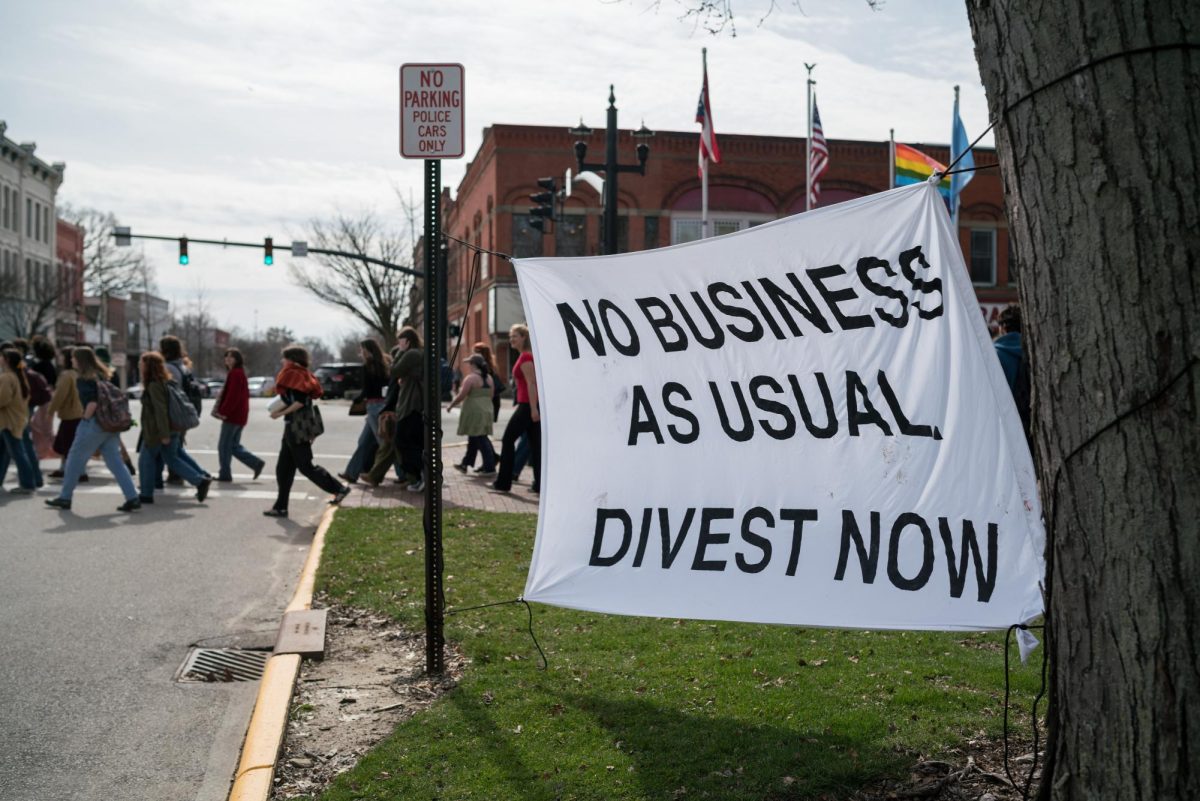On June 6, the Oberlin Board of Trustees Executive Committee discussed a proposal for the College to divest from companies involved in the Israeli occupation of Palestine. They ultimately voted down the proposal and released a five-page response explaining their reasoning Aug. 14.
The proposal to divest from Israel was submitted in April by six students.
Two of the students who drafted the proposal, Jonas Nelson, OC ’24, and College fourth-year Olivia Wolgemuth, told the Review last spring that the proposal listed 130 companies to divest from. This list includes companies that directly fund attacks classified as genocide by courts or legal scholars, companies that provide military equipment or border security to Israel, and companies that do business within illegal Israeli settlements or aid the maintenance and expansion of Israeli settlements in Gaza, the West Bank, and East Jerusalem.
In the response, the Board wrote that feelings “run deep on all sides of the issue,” and stated that they held “many hours of meetings” with actors on both sides of the call for divestment before reaching their decision.
The Board gave several reasons why they felt that the divestment proposal failed to meet its standards for divestment. The first, in a section titled “Engagement versus disengagement,” is that divestment is a form of disengagement that should only be taken in extreme circumstances.
“Accepting this proposal could substantially limit our ability to deliver on Oberlin’s mission, namely, by reducing our financial resources and restricting critical discourse,” the response reads.
Additionally, the Board stated that they did not think divestment would be able to alter the actions of companies they are invested in. They pointed out that Oberlin’s endowment is invested in externally-managed funds rather than individual companies.
The Board also wrote that divestment, which would prevent the College from investing in broad market indices, like the S&P 500, would come at an immense financial cost to the school. The Board said this would reduce the school’s ability to provide scholarships and financial aid, and compensate faculty and staff.
The Board expressed concern that divestment would amount to the College taking a stance on an issue that students, alumni, and faculty are not in agreement on.
“The proposal’s submission contributes to critical discourse we associate with the liberal arts tradition,” the Board wrote. “By adopting the proposal, however, the College would be taking a clear institutional stand on one side of a fraught and contested issue that divides the Oberlin community. The Board believes that doing so could constrain critical thinking, discourse, and debate on the subject, which could jeopardize the College’s mission.”
Following the response, Oberlin College for Palestine took to social media to criticize the Board’s decision. In the caption of an Instagram post showing the Board’s response and a letter from President Carmen Twillie Ambar announcing the decision, the organization decried the College’s leadership.
“Shame on you, and shame on your support for the senseless killing of hundreds of thousands of people,” they wrote. “Your complicity does not reflect our liberal arts values or respect for human dignity, and we certainly are not putting our trust in you to represent us.”
The post said that the “fight for a Free Palestine and for Oberlin to divest from Israel” was not over.
Students for Free Palestine also voiced their concern in a statement to the Review.
“The Board of Trustee’s decision to reject our proposal to divest from companies that facilitate the Israeli Occupation of Palestine, despite overwhelming displays of community support, is representative of their failure to uphold the so-called progressive values this institution boasts and their [allegiance] to dollars over human lives,” they wrote. “It is a disgrace that the Board not only refuses to oppose genocide, but that it justifies its decision by weaponizing low income students and doing so in the name of preserving ‘liberal arts’ discourse and a fear of ‘disengagement.’ How can we engage with them and believe they come to these conversations in good faith when they refuse to even say the word ‘Palestine’?”
SFP references the fact that Palestine is only mentioned once in the response, in the title of the submitted divestment proposal.
Not all Oberlin students are for divestment. In an email to the Review, Obies for Israel applauded the Board’s decision not to divest, saying that they believed divestment would have no effect on the war in Gaza, hurt low-income students, and go “against Oberlin’s mission to serve through critical productive engagement.”
“The only practical effect of divestment resolutions, such as the one put forth by SFP, have been increases in antisemitism on college campuses, and creating a threatening and violent college environment for Jewish students,” the statement read. “In this time of increase[d] antisemitism, we are grateful to the Board of Trustees for not lending credence to such hate. We applaud the Board of Trustees’ decision not to divest and we are relieved that this divisive issue has finally been put to rest. It is our hope that we can now move forward as a campus together.”
The proposal for divestment was accompanied by a survey of 1,630 Oberlin students, 94 percent of whom supported divestment, and letters in support of divestment signed by a total of 1,200 alumni and 160 students. The Board pointed out that while this showed substantial support for divestment, Oberlin has almost 3,000 students and 40,000 alumni, some of whom may have differing views.
According to the school’s divestment policy adopted in 2014, the Board is required to consider and provide a written response to calls for divestment submitted by students, alumni, and faculty. The Board was looking to determine if the proposal fit the conditions for divestment outlined in the school divestment policy. Namely, if investments “contribute to conditions that shock the conscience,” if divestment would influence the behavior of its target, and if divestment was “acceptable to the greater Oberlin community.” According to the response, the Executive Committee “held a robust and lengthy discussion of the proposal” before coming to their decision and consulted with the investment committee on the financial impact.
In 2015, a separate proposal to divest from Israel was rejected by the Board. During the 2023–24 school year, calls for divestment were renewed following the Oct. 7 attacks by Hamas and the beginning of the war in Gaza. Protests calling for divestment occurred on campus throughout the late fall and spring, culminating in the establishment of the “People’s College of Oberlin” on Wilder Bowl in May. Most recently, Palestinian activists protested at Oberlin’s commencement ceremony, with some graduates standing and facing away from President Ambar or handing her pamphlets as they walked across the stage. Activists also held a vigil outside of Illumination at Heisman Field house.
SFP said the organization would continue its activism this semester including fundraisers for Palestinians in Gaza; efforts to educate the campus on the conflict; and events that celebrate Palestinian history, art, and culture. They will begin with an event called Divestment 101 this Saturday.
“While divestment is an important goal, we recognize that it is a long term endeavor, and the ongoing genocide and forced scarcity needs urgent attention and mobilization,” they wrote in an email to the Review.









